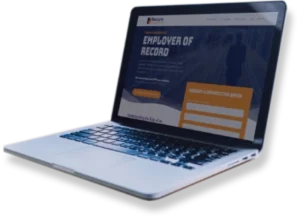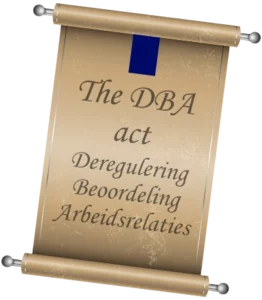Struggling with Less Than 3 Clients? Discover Why That’s a Problem as a Freelancer in the Netherlands

If you are a freelancer in the Netherlands, you have probably heard a few things about the “new” DBA Act – or maybe you’re just now coming across it. Either way, it’s essential to understand what it means for your work, how it relates to false self-employment, and why the Dutch government is paying more attention to it lately.
The DBA Act
The DBA Act (short for Deregulering Beoordeling Arbeidsrelaties) is a law designed to prevent false self-employment in the Netherlands. Despite what most people will tell you, this is not a brand-new rule – it’s just that enforcement of it in 2025 has been getting stricter.
What Is False Self-Employment?
For years, companies have hired freelancers who were, in practice, working like employees, just without the protection or benefits that regular team members receive. This allowed some businesses to save money and avoid responsibilities like paying sick leave or employer contributions. Meanwhile, freelancers were left with fewer rights and less social security.
“Hiring someone as an independent contractor does not automatically make the working relationship freelance. If it looks and functions like employment, it is employment.”
— Belastingdienst, 2023
Over 1.2 million people in the Netherlands are registered as self-employed. However, the number of workers misclassified as freelancers may be as high as 10–15%, especially in sectors like construction, healthcare and IT, according to the Economic Policy Institute.
The Dutch government aims to create a fairer system, where legitimate freelancers can still operate with the flexibility they currently have, but where workers who are effectively employees are given proper protection.
Why The Number of Clients Matters
One of the key ways the tax authorities determine whether you are a real freelancer is by looking at the number of clients you have. If you only work with one company, or even just one main client, you could be at risk of being misclassified as an employee.
As a general rule of thumb:
- If you have three or more clients = you’re seen as a genuine freelancer.
- If you have fewer than three = you are at a higher risk of being classified as an employee in disguise.
If a company controls your hours, tasks and how you do your work, you can fall under the false self-employment classification in the eyes of the law.
How Employers Can Unknowingly Fall into the Trap
Businesses, especially those based abroad, that browse freelance platforms looking for professionals or those that regularly work with the self-employed (such as building companies, online platforms, and IT startups) need to pay extra special attention to the freelancers they enter a contract with.
Consider this example:
You have contacted our recruitment agency, Blue Lynx, to find you a freelance copywriter for your new website. We place a freelancer into a long-term, full-time role with your organisation. If they don’t have multiple clients or the freedom to control the way they work, the tax authorities may view it as disguised employment. This is why both agencies and ZZP’ers need to be aware of the rules under the DBA Act.
While in the above case the mistake is unintentional, plenty of businesses try to avoid paying taxes and social contributions by intentionally misclassifying workers. From 2026 onwards, companies will be audited and may receive a post-assessment.
The good news is that businesses and freelancers still have time to react to this stricter enforcement of the rules. 2025 is considered a transition year, giving them plenty of time to set their bookkeeping in order and decide how to proceed. However, once 2026 rolls around, companies could be fined for this false employment.
What About Freelancers?
If you’re working full-time for just one client, consider this your wake-up call. Not just because the company hiring you could get in trouble, but because you could be left without proper support if something goes wrong. But this is not the only problem. You could also run into issues like:
- Unexpected tax bills and fines.
- Unexpected notice and lack of security.
- Fewer freelance jobs in the Netherlands.
Some people think they can stop working independently for a while and “reset the clock” – but unfortunately, that’s not true. If you return to the same client doing the same kind of work, the tax office will see it as a continuation of the same relationship.
Employer of Record as a Solution
 A lot of independent workers in this position are in a pretty tight spot. One answer to the problem they’re facing is getting hired through an EoR – an administrative employer that can second them to the client company.
A lot of independent workers in this position are in a pretty tight spot. One answer to the problem they’re facing is getting hired through an EoR – an administrative employer that can second them to the client company.
A freelancer would be working for an Employer of Record only on paper. Otherwise, they would continue doing business with their client as usual. The EoR model handles all the admin and compliance on their behalf, making their professional relationship perfectly legal.
On top of this, the freelancer also receives some great benefits:
- Legal clarity and zero risk of misclassification.
- Access to benefits like sick pay and pension.
- Less stress and paperwork for both parties.
- Freedom to focus on the tasks at hand.
Instead of being a one-man army handling all your admin, taxes and compliance, you can leave it to a company like ours. Blue Lynx EoR is an affordable option and a great opportunity for companies and independent workers to find peace of mind and great working conditions.
[CTA Button – Discover Blue Lynx EoR]
Other Ways to Prevent False Self-Employment
If you don’t want to use an EoR, you can make an assessment of your client relationship to discover if it qualifies as bogus self-employment.
The following official websites and references might help:
- An employment evaluation tool on the government website (in Dutch).
- The Dutch tax authorities’ platform (in Dutch).
- False self-employment and businesses in detail here.
Final Thoughts
If you’re working for a single client as a self-employed professional or have fewer than three, now is a great time to reassess:
- Are you truly independent?
- Could you benefit from a different structure like Blue Lynx EoR?
- Do you want to be protected if you fall ill or lose your main client?
Don’t wait for an audit to find out. By staying informed and adjusting your setup, you can keep working legally, safely and confidently.


